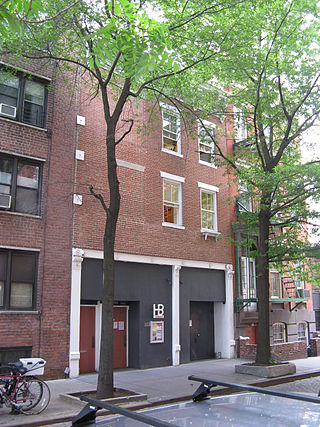Related Research Articles

James Ingram Merrill was an American poet. He was awarded the Pulitzer Prize for poetry in 1977 for Divine Comedies. His poetry falls into two distinct bodies of work: the polished and formalist lyric poetry of his early career, and the epic narrative of occult communication with spirits and angels, titled The Changing Light at Sandover, which dominated his later career. Although most of his published work was poetry, he also wrote essays, fiction, and plays.
The Penguin poetry anthologies, published by Penguin Books, have at times played the role of a "third force" in British poetry, less literary than those from Faber and Faber, and less academic than those from Oxford University Press..
J. D. "Sandy" McClatchy was an American poet, opera librettist and literary critic. He was editor of the Yale Review and president of The American Academy of Arts and Letters.
The Glascock Poetry Prize is awarded to the winner of the annual Kathryn Irene Glascock Intercollegiate Poetry Contest at Mount Holyoke College. The "invitation-only competition is sponsored by the English department at Mount Holyoke and counts many well-known poets, including Sylvia Plath and James Merrill, among its past winners" and is thought to be the "oldest intercollegiate poetry competition."
The MacArthur Fellows Program, also known as the MacArthur Fellowship and colloquially called the "Genius Grant", is a prize awarded annually by the John D. and Catherine T. MacArthur Foundation to typically between 20 and 30 individuals working in any field who have shown "extraordinary originality and dedication in their creative pursuits and a marked capacity for self-direction" and are citizens or residents of the United States.

Judith Moffett is an American author and academic. She has published poetry, non-fiction, science fiction, and translations of Swedish literature. She has been awarded grants and fellowships from the National Endowment for the Arts and the National Endowment for the Humanities and presented a paper on the translation of poetry at a 1998 Nobel Symposium.
The Lannan Literary Awards are a series of awards and literary fellowships given out in various fields by the Lannan Foundation. Established in 1989, the awards are meant "to honor both established and emerging writers whose work is of exceptional quality", according to the foundation. The foundation's awards are lucrative relative to most awards in literature: the 2006 awards for poetry, fiction and nonfiction each came with $150,000, making them among the richest literary prizes in the world.
The Book Club was an Australian television show that discussed books, ostensibly in the style of a domestic book club. Hosted by journalist Jennifer Byrne, it used a panel format with two regular members – book reviewer Jason Steger and author/blogger Marieke Hardy – and two guest members. The show first aired on ABC on 1 August 2006 and was scheduled as a monthly program. The show concluded in 2017.
Rachel Hadas is an American poet, teacher, essayist, and translator. Her most recent essay collection is Piece by Piece: Selected Prose, and her most recent poetry collection is Ghost Guest. Her honors include a Guggenheim Fellowship, Ingram Merrill Foundation Grants, the O.B. Hardison Award from the Folger Shakespeare Library, and an Award in Literature from the American Academy and Institute of Arts and Letters.

The HB Studio is a non-profit 501(c)(3) organization offering professional training in the performing arts through classes, workshops, free lectures, theater productions, theater rentals, a theater artist residency program, as well as full-time study through their International Student Program and Uta Hagen Institute.
Stephen Yenser is an American poet and literary critic who has published three acclaimed volumes of verse, as well as books on James Merrill, Robert Lowell, and an assortment of contemporary poets. With J.D. McClatchy, he is co-literary executor of the James Merrill estate and co-editor of six volumes of Merrill's work.
The Fellowship of the Academy of Social Sciences (FAcSS) is an award granted by the Academy of Social Sciences to leading academics, policy-makers, and practitioners of the social sciences.
References
- 1 2 J. D. McClatchy. Braving the Elements, The New Yorker, 27 March 1995. Retrieved 27 May 2013.
- ↑ Swansburg, John. The View From/Stonington; If the Walls Could Talk, It Would Be Poetry, The New York Times, 28 January 2001. "[I]n the 1950s he established the Ingram Merrill Foundation, which until it ceased to exist in 1996, gave grants to writers, artists and other foundations. By the mid-90s, Merrill was donating around $300,000 a year through the foundation." Retrieved 27 May 2013.
- ↑ Berg, Paul. "Puppets For Adults," St. Louis Post-Dispatch 18 Apr. 1965.
- ↑ Hammer, Langdon. James Merrill: Life and Art. New York: Alfred A. Knopf, 2015. 491.